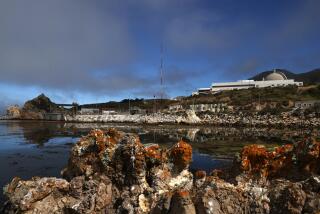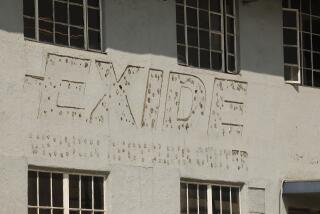Rockwell Foes Urge Denial of License for Nuclear Work : Santa Susana ‘Hot Lab’ Seeks 10-Year U.S. Permit Extension
- Share via
Opponents of nuclear work at the Santa Susana Field Laboratory Thursday night implored the U.S. Nuclear Regulatory Commission to deny Rockwell International’s request for renewal of its radioactive materials license, calling on the company “to clean up and clear out” the nuclear part of its business.
At a public hearing in Van Nuys attended by 150 people, speaker after speaker attacked Rockwell’s credibility, and argued that nuclear work should not be carried out in a densely populated area.
Don Wallace, a Calabasas resident and spokesman for the Rocketdyne Cleanup Coalition, told an NRC administrative judge that the group opposes the relicensing “because we think that our property values . . . our physical, emotional and psychological health are more important than the equity of Rockwell stockholders.”
Rocketdyne is the division of Rockwell that operates the laboratory on a rugged plateau in the Simi Hills three miles west of Chatsworth.
Fears of a ‘Silent Threat’
Barbara Johnson, president of the Susana Knolls Homeowners Assn., whose members live within 2 1/2 miles of the research site, said residents until recently were generally unaware of Santa Susana’s nuclear work and knew it “simply as ‘the place that tested rockets and made all those roaring noises’ .”
“Now we fear the silent threat of contamination from radioactive and toxic materials. What we don’t know frightens and concerns us,” Johnson said. “To issue a license for nuclear activity in our midst is to play with our lives. Enough is enough.”
Each of the first dozen speakers assailed Rockwell’s relicensing request, except for a company official who drew a smattering of applause when he told of moving his family to the West Valley several years ago.
Joseph Mills said he wouldn’t have moved “into this area if I didn’t believe it was totally safe.”
Dr. Sol Londe, a Northridge resident and member of the pro-disarmament group Physicians for Social Responsibility, said he opposed relicensing because nuclear fuel recycling at Santa Susana would provide plutonium for use in nuclear weapons.
Mark Lit, another Northridge resident, said Rockwell should be denied a license because it is years away from removing contamination from past nuclear work.
Informal Hearing
The hearing was run by NRC Administrative Judge Peter B. Bloch, who will rule on Rockwell’s license request. Bloch said the hearing was informal and will not be part of the record on which his decision is based.
At a second hearing, scheduled for 9:30 a.m. today, Bloch will consider whether to grant opponents of the license an intervenor status, which would allow them to present evidence and file rebuttals to the company’s case. Those seeking intervenor status included Jon Scott of Bell Canyon, Northridge residents Jerome Raskin and Estelle Lit, and 35 other people who signed letters opposing the license request.
In addition, officials of the Natural Resources Defense Council, a national environmental group, said they would request intervenor status at today’s hearing.
At stake is the NRC license that allows Rocketdyne to dismantle for recycling nuclear fuel and work on other nuclear projects at the Santa Susana “hot lab.” The license expired in June, but has been continued while the NRC reviews the renewal request.
From about 1960 until 1986, when its last contract ran out, Rockwell used the hot lab to dismantle, or “declad,” nuclear fuel for the U.S. Department of Energy’s weapons program. The work involved cutting open the metal casing of spent nuclear fuel rods, removing plutonium, uranium and other radioactive materials, and shipping them to government reservations.
10-Year Extension
The company is seeking a 10-year license extension in hopes of landing new decladding contracts and to do other nuclear work in the hot lab.
Local opponents of the license, calling themselves the Rocketdyne Cleanup Coalition, argue that Rockwell has failed to safely manage Santa Susana and other nuclear sites, and that nuclear work does not belong in a densely populated area.
Rockwell officials say they have run the Santa Susana lab safely, and that it poses no danger to workers or neighbors.
The NRC staff still has to compile environmental and safety reports on the Santa Susana lab, and the license decision could be months away.
But NRC officials have said in the past they know of no unusual environmental or safety problems at the lab. They are not expected to deny the relicensing request.
Even if they did, it would not spell the end of Santa Susana’s nuclear activities. That is because most nuclear work there has been exempt from licensing, under the 1950s provisions of the Atomic Energy Act that allow the Department of Energy to function as customer and regulator of nuclear work by its contractors.
Rocket Test Site
The 2,668-acre lab has been mainly devoted to rocket testing for the National Aeronautics and Space Administration and the Air Force, with only 290 acres reserved for nuclear and other energy work.
Santa Susana’s nuclear work has been a subject of controversy since disclosure in May of a DOE report on radiological and chemical contamination at the site. The report characterized the contamination as moderate and no threat to workers or neighbors. State health and federal Environmental Protection Agency officials have since echoed that assessment.
But the report showed more nuclear work had gone on at the lab than most people knew.
With the halt in decladding in 1986, the main nuclear activity has been cleaning up contamination from past projects. A number of cleanup projects remain, and the DOE has proposed spending about $40 million over the next five years for decontamination.
Even so, the Santa Susana fight has paled before the controversy over Rockwell’s management of the Rocky Flats nuclear weapons plant northeast of Denver, which produces plutonium triggers for nuclear bombs.
Rocky Flats Woes
Thursday’s NRC hearing came just six days after Rockwell and DOE made the stunning announcement that the embattled company, which has run Rocky Flats since 1975, was turning over management to a new contractor, EG&G.;
That announcement came on the heels of a lawsuit filed by Rockwell against the government in federal court in Washington. In that suit, Rockwell contended it was trapped between conflicting requirements of two federal agencies--the DOE, which it was obliged to supply with bomb parts; and the EPA, which barred storage and disposal of wastes from the manufacturing process.
Armed with search warrants, a squadron of EPA officials and FBI agents raided Rocky Flats in June to gather evidence of possible criminal violations of hazardous waste and water pollution control laws. The matter is now before a federal grand jury.
More to Read
Sign up for Essential California
The most important California stories and recommendations in your inbox every morning.
You may occasionally receive promotional content from the Los Angeles Times.













